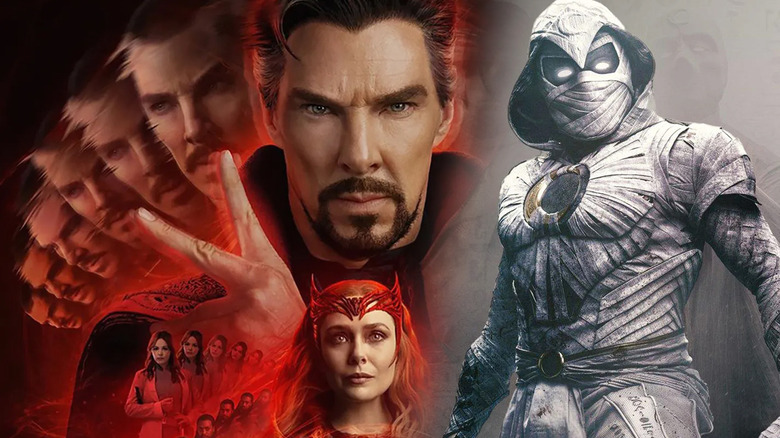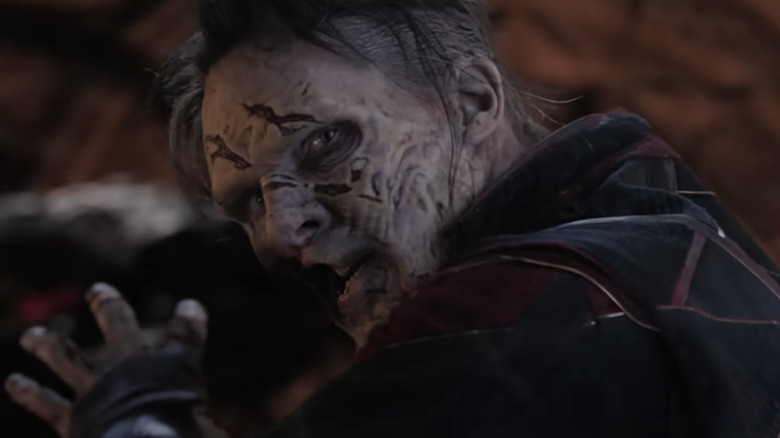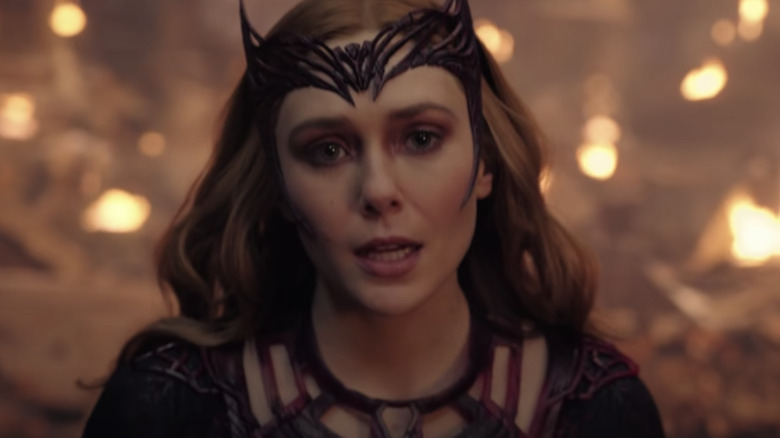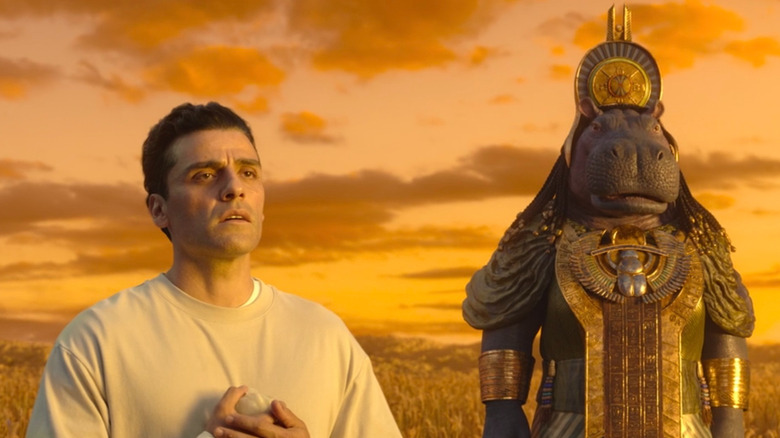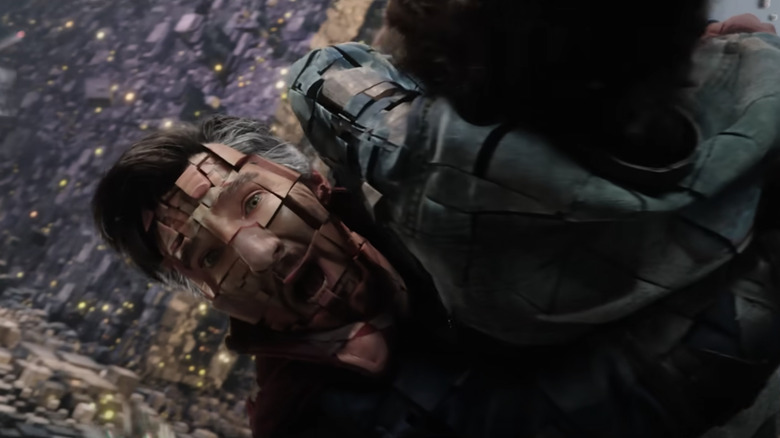Doctor Strange In The Multiverse Of Madness Gives The MCU An Immediate Course-Correction After Moon Knight
It's no coincidence, perhaps, that Marvel Studios released "Doctor Strange in the Multiverse of Madness" in the days immediately following the season finale (maybe series finale) of its Disney+ series, "Moon Knight." During Phase Four of the Marvel Cinematic Universe, we've seen some previous overlap between movies and streaming shows; however, in the case of "Black Widow" and "Spider-Man: No Way Home," they hit theaters between episode 5 and 6 of "Loki" and "Hawkeye," respectively.
"Multiverse of Madness" landed in U.S. theaters two days after the "Moon Knight" finale, and whether intentional or not, the movie acts as something of a palate cleanser, putting the longtime MCU viewer back on sure footing in a "Doctor Strange" sequel with characters we already know and care about. Is it more of the same? Yes, but that's not necessarily a bad thing when you're talking about big-screen spectacle winning out over at-home streaming boredom.
Whatever you think of "Moon Knight" (personally, I was not a fan), there's no denying that it was its own peculiar beast, somewhat disconnected from the rest of the MCU. The show spent six episodes letting us get to know a character who didn't even know himself. In the process, it introduced some bonkers new ideas to the MCU, further situating it in the realm of fantasy, as opposed to sci-fi, where it started in Phase One.
"Multiverse of Madness" features sorcery, witchcraft, and numerous gonzo elements, but it's also the continuation of more than one ongoing MCU storyline. The movie functions as much as a sequel to "WandaVision" as "Doctor Strange." It's the first MCU film to carry the "Hawkeye" billing of "A Kevin Feige production," and Feige is nothing if not savvy when it comes to crowd-pleasing and course-correcting the MCU. To that end, Stephen Strange (Benedict Cumberbatch) and Wanda Maximoff (Elizabeth Olson) help guide the audience back from the identity crisis of Marc Spector (Oscar Isaac) in "Moon Knight."
Further comparison of these two MCU titles invites discussion of specific plot points, so be forewarned: from here on out, there are potential MAJOR SPOILERS for both "Moon Knight" and "Doctor Strange in the Multiverse of Madness."
Blending in horror
Both "Multiverse of Madness" and "Moon Knight" are genre-benders that employ directors known for their horror work, with legendary "Evil Dead" creator and "Spider-Man" alum Sam Raimi making his return to superhero fare with Doctor Strange and his weird-haired, third-eyed variants. While four episodes of "Moon Knight" were helmed by Mohamed Diab, the remaining two episodes were directed by Aaron Moorhead and Justin Benson, a duo known for horror movies like "Resolution" and "The Endless."
"Multiverse of Madness" was originally set to be helmed by Scott Derrickson, the director of the first "Doctor Strange" movie. Derrickson, too, comes from a horror background, with a filmography that includes "The Exorcism of Emily Rose," "Sinister," and the upcoming "The Black Phone." Derrickson left "Multiverse of Madness" due to creative differences, and for some genre fans, seeing the "Doctor Strange" director reunite with "Moon Knight" star Ethan Hawke on a true horror film without superheroes might be more exciting than anything the MCU has to offer.
In "Moon Knight" episode 4, which Benson and Moorehead directed, there's a scary scene where a monstrous mummy lays someone out and removes their squishy internal organs. It feels like the first true horror scene we've witnessed in the MCU, yet it also is rather jarring in the context of a show and indeed a whole shared universe that has been geared toward a PG-13 audience.
"Multiverse of Madness" has its fair share of gruesome impalements and eyeball gouging, as well, to say nothing of its zombified "Doctor Strange" and the CG souls of the damned it smuggles in from Raimi's "Drag Me to Hell." The movie subverts the fan service of cameos with fatal fights, and turns Wanda, the nascent Scarlet Witch, into a relentless, scarred, Terminator-like foe. However, even though his directorial "voice" is very much subservient to Marvel's house style here, Raimi is more adept at juggling tones. He's made a whole career out of comedy horror, whereas Benson and Moorehead's films are more like horror dramas and not as cheeky.
'Is America okay?'
By now, the MCU and its shared-universe model carries with it the implicit understanding that each movie is not a standalone viewing experience and may even require a little homework. It has always had what Doctor Strange calls the "grand calculus" of that shared universe, now multiverse, in mind. Even if it's just a quick Google search or Wikipedia refresher, chances are, you might be left wondering about something and seeking out clarification after you watch an MCU film.
The movies don't offer recaps beforehand like the TV shows do, and when I watched "Multiverse of Madness," I was sitting next to a more casual viewer who didn't even remember who Karl Mordo (Chiwetel Ejiofor) was because the last "Doctor Strange" movie came out six years ago. Members of the fabled Illuminati — all of whom mind-map out to other Marvel movies and shows — went similarly unrecognized by my fellow theater patron (and spouse). She hadn't seen "WandaVision," which, as it turns out, isn't a prerequisite, but she could still understand Wanda's motivations, and that was enough to act as an emotional through-line.
Wanda inhabits a movie where characters escape to different dimensions, only to fall into traps. She embraces the idea that "dreams are windows into the lives of our multiversal selves." All she wants to do is be with her children, but in the end, she has to let them go and come back to her own ugly reality and face the damage she's wrought as an adult.
It's not so different from what might happened when a moviegoer, watching a superhero film that appeals to their inner child, is reminded of breaking news outside the theater like the Supreme Court overturning Roe vs. Wade, the case that set the legal precedent for a woman's right to choose. Forget the VFX-driven Raimi horror; the scariest thing in "Multiverse of Madness" is the extent to which the movie subtly comments on our own relationship, as the denizens of an infantilized geek culture, to the horrors of the real world. It gives new meaning to the name of the film's new young hero, America Chavez (Xochitl Gomez), especially when you hear that name uttered in the context of lines like, "Is America okay?"
In-universe vs. outside mythology
"Multiverse of Madness" is still dense and esoteric in terms of the Marvel of it all, but it's at least drawing from previous movies, shows, and Doctor Strange comics, the latter of which inform the mid-credits scene, where Charlize Theron suddenly shows up in a glam purple costume.
"Moon Knight" brought a different kind of referentiality to its narrative and was a little more unwieldy for that. The show co-opts Egyptian mythology for superhero silliness, making the existence of gods like the hippo-headed Tawaret, who isn't a comics character, canonical in the MCU (and as actual gods, not aliens mistaken for them by Vikings, per the Norse gods of "Thor"). For most viewers, the Tawaret reveal in "Moon Knight" will play one of two ways: either, it will milk shock value out of the sight of a talking hippo, or it will build on the viewer's familiarity with Egyptian mythology and the existing concept of a hippo goddess, in which case, the sight of Tawaret might seem entirely sensible.
The difference is that "Multiverse of Madness" is on-brand as Marvel. It refers to things in-universe (or, in-multiverse), whereas "Moon Knight" gives no context for certain things and presupposes academic knowledge of an outside mythology, one drawn from real Egyptian culture. The show did prep the viewer for the arrival of a "crocodile lady" with dialogue in episode 2, but the actual Ammit didn't arrive on Disney+ until four weeks later, by which point, the average viewer would most likely have forgotten about the passing mention of her crocodile-lady features.
"Moon Knight" also never explores the implications of having a Jewish superhero learn that the Egyptian gods are real. If anything, it's as loose about that aspect of Isaac's disassociated character as it was with Ethan Hawke's pronunciation of Mandarin Chinese, something even Shang-Chi himself, Simu Liu, noticed. Theoretically, Marc Spector and his family have celebrated Passover — the Jewish holiday celebrating the exodus of the Israelites from slavery in Egypt, thanks to Yahweh's (the Hebrew God) intervention and Moses' leadership. The show glosses over this, even though it unfolds over 300 minutes, where there should be more time for character-based moments.
Big-screen or bust
Whereas "Moon Knight" somewhat cheapens Egyptian mythology, rendering it less whitewashed but still the stuff of fantasy-action nonsense à la "Gods of Egypt," "Multiverse of Madness" knows exactly what it is: a superhero movie, drawing from Marvel history.
I would need to rewatch "WandaVision" to fully judge how well Wanda's character arc in "Multiverse of Madness" aligns with that show, but in the theater, Olson made it work. She is the best thing the movie has going for it, and it felt good catching up with her, Strange, Wong (Benedict Wong), and Christine Palmer (Rachel McAdams).
Even before "Multiverse of Madness," our viewing habits with the MCU had changed significantly during Phase Four. The advent of Disney+ in November 2019, just before the pandemic, rendered old consumer behavior, such as digitally purchasing the movies, moot, since most of the them are now available to stream at any time with a subscription.
"Multiverse of Madness" confirms that the MCU is best experienced on the big screen. It made me think of Martin Scorsese's controversial remarks a few years ago where he likened Marvel movies to "theme parks." Scorsese made a valid comparison, but I don't see theme parks as a pejorative. Sometimes, it's just fun to board a thrill ride, get lost in the spectacle, and then be done with it.
Not every ride needs to be re-ridden and not Marvel thing needs to be rewatched (or even watched at all). Years before the current fleet of official MCU shows, we had already reached a point where the market was oversaturated with shows like Netflix's "The Defenders," ABC's "Agent of S.H.I.E.L.D.," FX's "Legion," and Freeform's "Cloak & Dagger," to name just a few. It seemed impossible to keep up with every single one of them.
The simple truth of the matter is, there are too many viewing options spread across too many different streaming platforms now, and Marvel/Disney+ are just one of those options. "Doctor Strange in the Multiverse of Madness" offers a trip to the theater, where the MCU was born and will continue to thrive, regardless of what happens on the small screen in higgledy-piggledy detours like "Moon Knight."
